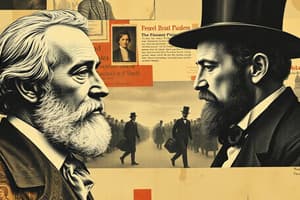Podcast
Questions and Answers
Which factor encouraged new ways of thinking about politics, economics, and society prior to the French Revolution?
Which factor encouraged new ways of thinking about politics, economics, and society prior to the French Revolution?
- Financial mismanagement
- Rising inequality
- The American Revolution (correct)
- The Industrial Revolution
What period did the French Revolution span from?
What period did the French Revolution span from?
- 1689 to 1799
- 1789 to 1899
- 1800 to 1900
- 1789 to 1799 (correct)
What exacerbated economic hardship in France prior to the French Revolution?
What exacerbated economic hardship in France prior to the French Revolution?
- Rising wages
- King Louis XVI's financial mismanagement (correct)
- Industrialization
- Peace and stability
Who initially sought to limit the third estate's voting power in the Estates-General?
Who initially sought to limit the third estate's voting power in the Estates-General?
What was the bold move made by the third estate in response to King Louis XVI's attempt to limit their voting power?
What was the bold move made by the third estate in response to King Louis XVI's attempt to limit their voting power?
What document proclaimed that all men are born free and equal, establishing the fundamental principle of the modern democratic state?
What document proclaimed that all men are born free and equal, establishing the fundamental principle of the modern democratic state?
Who led the Reign of Terror in France, seeking to eliminate enemies of the revolution?
Who led the Reign of Terror in France, seeking to eliminate enemies of the revolution?
Which event inspired French citizens to demand a new political order prior to the French Revolution?
Which event inspired French citizens to demand a new political order prior to the French Revolution?
Which revolutionary concept became an ideological rallying point for later generations?
Which revolutionary concept became an ideological rallying point for later generations?
Which era followed the Reign of Terror and brought some stability to France under a military leader?
Which era followed the Reign of Terror and brought some stability to France under a military leader?
Which legal document sought to establish a fair and rational legal system after the French Revolution?
Which legal document sought to establish a fair and rational legal system after the French Revolution?
What impact did the French Revolution have on world history according to the text?
What impact did the French Revolution have on world history according to the text?
Flashcards are hidden until you start studying
Study Notes
The French Revolution: Unraveling the Beginnings of Modern Europe
The French Revolution, a period spanning from 1789 to 1799, fundamentally transformed French society and ended a century of monarchical rule. This whirlwind of change laid the groundwork for modern European politics and ignited the flames of democratic ideas that continue to resonate today.
Causes and Conditions
The Revolution's roots lay in a complex interplay of factors. The Enlightenment, a period of intellectual and philosophical ferment, encouraged new ways of thinking about politics, economics, and society. Financial mismanagement and a massive national debt under King Louis XVI exacerbated economic hardship, particularly in the countryside. Rising inequality, exorbitant taxes, and the American Revolution's success against British rule inspired French citizens to demand a new political order.
The Estates-General
In 1789, King Louis XVI summoned the Estates-General, a legislative body consisting of three estates: the clergy, the nobility, and the commoners. Protests erupted when he initially sought to limit the third estate's voting power. The third estate responded by declaring itself the National Assembly, composed of elected representatives of the people. This bold move signaled a decisive shift towards democracy.
The Declaration of the Rights of Man and Citizen
The National Assembly quickly adopted the Declaration of the Rights of Man and Citizen, proclaiming that all men are born free and equal, the fundamental principle of the modern democratic state. This document, along with the Constitution of 1791, established the legal framework for the new French regime.
The Reign of Terror
After the monarchy's collapse, the revolution took a more radical turn, characterized by the Reign of Terror (1793-1794). Robespierre, the guillotine's most ardent champion, led this period of political purification, seeking to eliminate all enemies of the revolution. The Reign of Terror claimed the lives of thousands of French citizens, including King Louis XVI.
The Napoleon Era
Following the Reign of Terror, France entered an era of relative stability under Napoleon Bonaparte, a military leader who rose through the ranks during the Revolution's early years. The Napoleonic Code, a comprehensive body of laws, sought to establish a fair and rational legal system, laying the foundation for modern European law.
Legacy
The French Revolution left an indelible mark on world history. The ideas of liberty, equality, and fraternity became the ideological rallying point for generations of revolutionaries. The revolution also paved the way for the rise of nationalism, democratic forms of government, and the European state system. Although violent and turbulent, the French Revolution stands as a landmark event, demonstrating the power of the human spirit to transform society and bring about profound change.
Sources
- Beales, D. (1992). The French Revolution. Oxford: Oxford University Press.
- Furet, F., & Richet, J.-F. (1996). The French Revolution. Cambridge: Cambridge University Press.
- Mossé, R. (1969). The French Revolution: A Historical Essay. New York: Basic Books.
- Maza, B. (2004). A Concise History of the French Revolution. Cambridge: Cambridge University Press.
- Tackett, T. (2006). The Coming of the French Revolution. London: Palgrave Macmillan.
- Wilson, J. (2015). The French Revolution. Oxford: Oxford University Press.
Studying That Suits You
Use AI to generate personalized quizzes and flashcards to suit your learning preferences.



